“And I would say I love you, but saying it out loud is hard.”
Futile Devices – Sufjan Stevens
When Elio Perlman (Timothée Chalamet) finds the courage to speak and tell his family’s summer houseguest, Oliver (Armie Hammer), how he really feels about him, he does so indirectly. The 17-year-old’s words are futile devices, posing questions more than providing answers. Words alone can’t convey the enormity of Elio’s feelings for the 24-year-old American graduate student. His body, moving closer to Oliver’s, speaks more clearly. The question “Is it better to speak or to die?” – drawn from a French medieval tale in which a young knight anxiously wonders if the woman he loves feels the same way – echoes throughout Luca Guadagnino’s Call Me by Your Name, a film where dialogue is used minimally for maximum effect. Its most powerful moments contain little or no words at all.
Timothée Chalamet’s performance as Elio is perfectly calibrated to communicate this tension between speech and silence. He repeatedly exposes how out of synch Elio’s words and actions are when it comes to his burgeoning desire for Oliver. Elio barely speaks; when he does, he’s rarely able to say what he means. Words frequently fail. Chalamet’s line readings convey how Elio’s precocious intelligence and bookish knowledge function like a shield against his lack of life experience. As the son of an academic and a voracious reader himself, Elio has faith that language can reveal the truth about the world; that words give ideas a discernible shape. But Oliver’s arrival completely dismantles this. Unable to rely on language, Elio comes to understand his desire for Oliver through his body, not his mind.
Revealing how he really feels is a risk for Elio. He protects himself by keeping his distance from Oliver. When he does venture closer he’s abrasive at first. Elio is aware of this flaw. After their piano flirtation, we see Elio scribbling in his diary that he had previously been “too harsh” towards Oliver. He has used the wrong words. Even when Elio is ready to tell Oliver how he feels, he stumbles and circumvents what he really means. When Elio and Oliver walk around the Battle of Piave monument, Oliver’s question, “Is there anything you don’t know?” is a loaded one. About to divulge how he feels, Elio says that he knows little about “the things that matter,” but isn’t able to elaborate aloud on what those things are. “You know what things,” he says, instead. Chalamet’s emphasis on ‘things’ poses an innocent challenge. He looks up, hoping Oliver will speak for him.
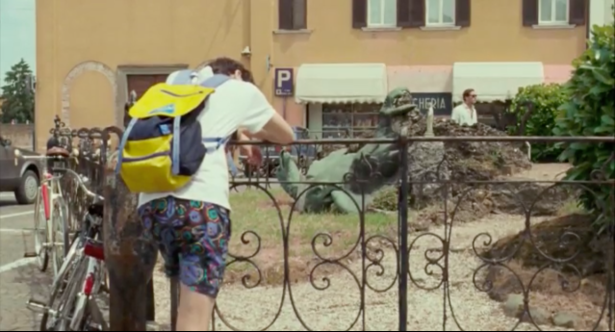
If words don’t come easily to Elio, Chalamet’s performance makes sure that his physical and facial gestures are less ambiguous. We see this when Oliver doesn’t show up for dinner one night early in his stay. With an exaggerated flourish of his hand, Elio mocks Oliver’s habit of saying “Later!” But behind this air of irritated indifference, Chalamet lets Elio divulge something more fragile. As the housekeeper, Mafalda (Vanda Capriolo), removes Oliver’s plate from the table, Elio’s attitude shifts from swagger to disappointment. With wet eyes he looks towards his mother (Amira Casar) for reassurance and comfort. That night, Elio is restless and horny. We see him tossing and turning in bed, unable to sleep. Chalamet’s sharp, jerky movements reveal once again how Elio’s body betrays him. He might seem impervious to Oliver, but something is clearly stirring inside him.
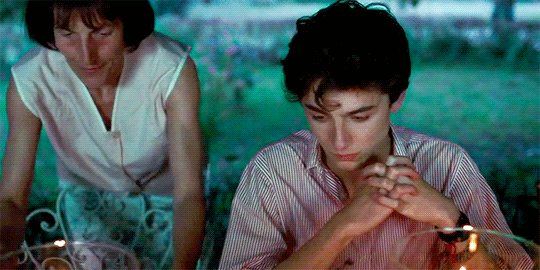
Without first-person narration to bring us inside Elio’s head (as André Aciman uses in the novel), we access his vulnerabilities, obsessions, and confusion almost entirely through Chalamet’s physical performance. Guadagnino favours wide shots over close ups, which demand that Chalamet use all of his slight, lanky body and beautifully expressive face to communicate Elio’s inner life. Chalamet varies his posture, shrugs his shoulders, slumps, and struts to express the tumultuous mess that lies beneath Elio’s seemingly calm surface. Every movement is a confession. Chalamet’s body declares when Elio’s confidence is increasing, too. At Elio’s secret reading place by the river, Chalamet’s spine straightens and Elio looks Oliver directly in the eyes. A two-shot captures this very deliberate incursion into Oliver’s space. Without words, we understand that Elio is daring Oliver sexually, as well as revealing his own emotional growth.
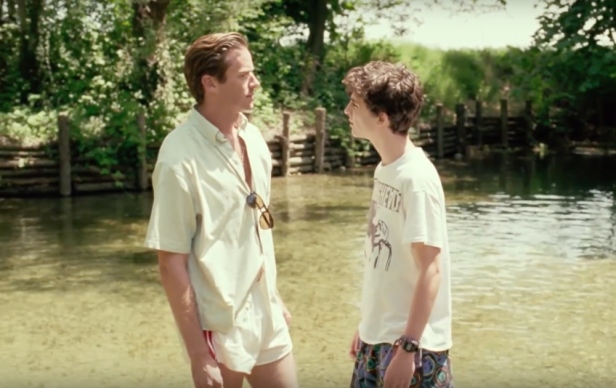
Chalamet is an intelligent, watchful, responsive, and unguarded performer. Elio is smart, but shy and uncertain. Using these skills, Chalamet lets Elio disclose the most about himself when he seems to be doing nothing more than sitting, standing, sulking silently, or lying still. We see this as he sits and listens to his father (Michael Stuhlbarg) speaking to him in the film’s penultimate scene. Throughout Call Me by Your Name, the palpable tension in Chalamet’s body and face make it clear that Elio is always in the process of thinking and feeling something. Elio’s earliest interactions with Oliver are shaped around a dynamic of looking and listening at a distance. He first sees him from his bedroom window where he says to Marzia (Esther Garrel) that Oliver “seems very confident.” While Chalamet delivers the line with a resentful, judgmental tone, his body practically leaps to the window to see Oliver, suggesting excitement and acute curiosity.
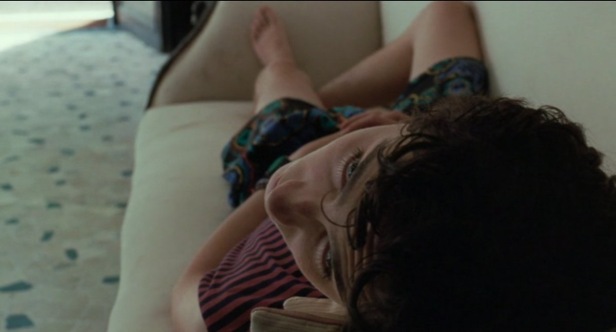
Whether Elio is watching Oliver from across the lawn, or as Oliver slow dances with Chiara (Victoire Du Bois), Chalamet translates Elio’s constant internal monologue with eyes lowered and lips often slightly parted. This gives him both a thoughtful and sensual expression. At Oliver’s first breakfast with the Perlmans, Elio watches Oliver intently and silently. Guadagnino moves the camera in so we see Elio observing Oliver’s necklace, a Star of David pendant that becomes a symbol of connection between the two Jewish men. In addition, Oliver’s statement about his appetites — if he eats more than one oozing soft-boiled egg, he won’t be able to stop — intrigues Elio. “I know myself,” Oliver declares, and Chalamet registers the significance of this statement with a shift in expression. Elio doesn’t speak but looks at Oliver quizzically, unsettled by this decisiveness; he’s less sure of himself. Similarly, when Marzia tells Elio that Chiara wants Oliver “no matter what,” Elio is fascinated by this intensity of feeling — as well as the sight of Oliver’s body moving. Both inflame his interest; he leans forward in his chair, eyes wide open, biting his lip in consideration.
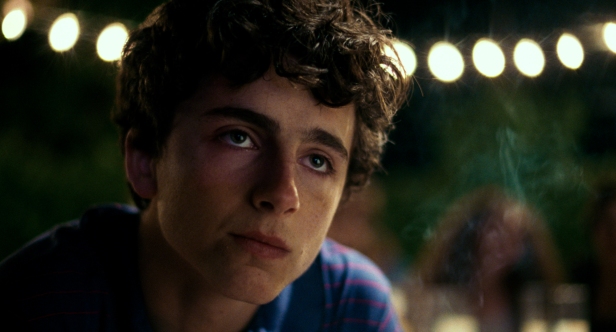
Chalamet’s performance captures Elio’s insecurity and teenage arrogance. When Oliver attempts to take control of the situation between them, massaging Elio’s shoulder during a volleyball game, Chalamet draws attention to his confusion. The incursion into his space stops Elio dead in his tracks. Guadagnino is keenly interested in Elio’s response to being touched here. The camera moves from Elio’s shoulder around to face him and takes in how his entire body reverberates. His expression hardens. He looks stunned; his shoulders tense. He doesn’t know what to say, except, unconvincingly, that he is relaxed. Is Elio annoyed, uncomfortable, turned on, or some combination of all of these? The way Chalamet looks at Hammer in this scene, along with his rigid movements — stepping away, refusing to surrender his body into Oliver’s hands — captures an authentic reaction. Elio is not yet able to read the signs that Oliver is trying to send him about his own desire.
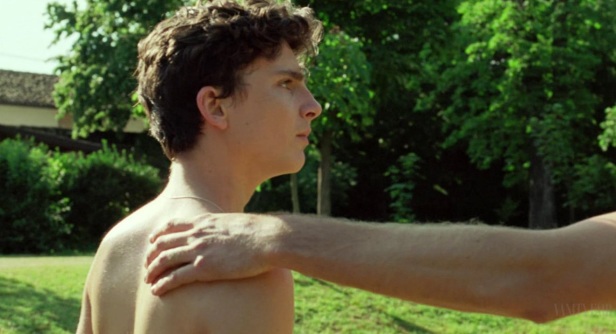
Elio’s desire for Oliver, who is so comfortable in his own skin, effectively draws him out of his head and into his body. Chalamet builds Elio’s aroused physicality into his performance. Once his desire is awoken, he seems to be in perpetual motion. Chalamet employs nervy but daring physical gestures to communicate Elio’s eagerness to discover more. We see this first when Elio joins Oliver on the dance floor for “Love My Way” by The Psychedelic Furs. Elio zooms in and out of Oliver’s space, enjoying a new sense of physical freedom. Chalamet’s body roll communicates how Elio is becoming more at ease with himself. In the days that follow, Elio finds himself home alone and bored. He ends up in Oliver’s bedroom and places Oliver’s discarded red swimming shorts over his face. He breathes in Oliver’s scent, absorbed in the urgency and arousal of this clandestine moment. Chalamet builds and releases sexual tension with his body, thrusting up and down slowly on the bed. With the shorts masking Elio’s face, Guadagnino can focus on the full extension of Chalamet’s body in these actions.
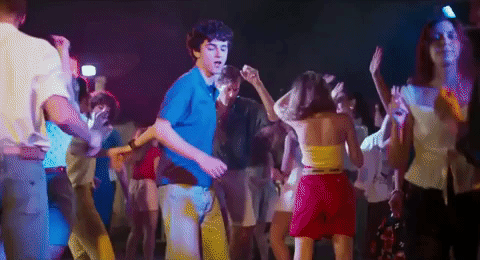
Chalamet’s performance deepens as Elio’s experience does. But rather than expanding and exaggerating with Elio’s increased feelings, Chalamet’s physical expressions reduce and focus. Small gestures highlight Elio’s inexperience, hungry enthusiasm, and also his fears. His moves towards Oliver are initially tentative, exploratory, and awkward. Elio’s fingers reach out to touch Oliver’s face and neck during a foot massage; when they kiss on the grass by the river, his mouth is wide open, then his tongue explores Oliver’s lips, not daring to venture further in. Before they have sex, Elio playfully bites at Oliver’s shoulder then scampers up his body.
Elio’s insecurities emerge after he and Oliver sleep together. Chalamet reintroduces Elio’s cool remoteness. While Oliver moves closer, Elio sits up and draws his body away, turning his head to the window. Through the tilt and tension in his head, Chalamet captures the full impact of Elio’s sexual experience with Oliver. We see that he is unsure about what has happened between them. Having sex with a man for the first time isn’t simply the achievement of a much longed for goal, but an experience that unleashes ecstasy, confusion, and further self-doubt.
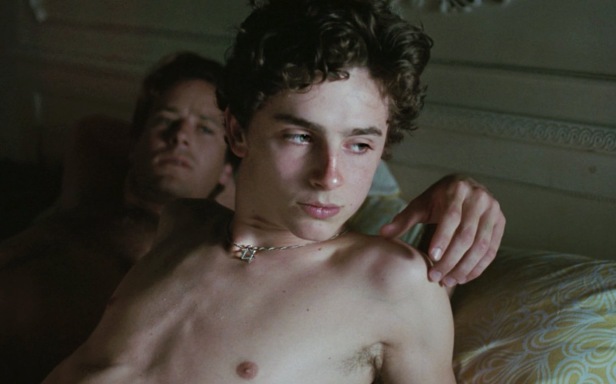
Chalamet uses his shoulders, eloquently, too. They repeatedly express Elio’s helplessness as his time with Oliver comes to an end. He softens and collapses them at the conclusion of the ‘peach scene’ as he falls into Oliver’s arms and cries, “I don’t want you to go.” On their final night together in Bergamo, before Oliver runs towards the sound of “Love My Way,” Elio falls again into Oliver’s arms — both surrendering to the moment and exposing how utterly defenceless he is. Elio is unable to raise his arms to embrace Oliver at the train station as they silently say goodbye; he’s so frail he can only give a small squeeze in return. As a devastated Elio calls his mother to collect him, Chalamet curves his shoulders forward once again, betraying just how vulnerable Elio is before the tears even start. Back at home, Elio is at first poised and restrained when he and his father talk. But Chalamet gradually exposes Elio’s nerve endings — leaning closer to Stuhlbarg until his shoulders crumble completely.
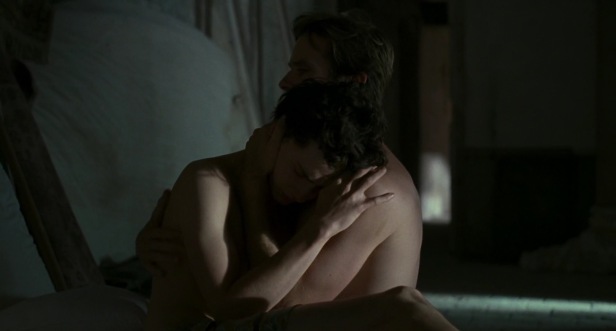
Call Me by Your Name concludes with an extended close-up sequence of Elio’s face that highlights the wisdom and authenticity of Chalamet’s performance. It is Hanukkah, the winter after the summer that has changed Elio’s life. After a devastating phone call from Oliver, Elio sits down in front of the fireplace, ostensibly seated before the camera, and silently expresses his grief. He cries. He aches. He gets angry. There is a flash of a smile; a joyous memory. Perhaps bittersweet acceptance and a sort of resolution, too. For several minutes, as the credits roll and Sufjan Stevens sings the line, “I have loved you for the last time” (from the song “Visions of Gideon”), Chalamet doesn’t speak and barely moves, beyond subtle modulations of his mouth, eyes, and breath. Yet he does everything required to bruise our hearts while showing us that Elio’s is caving in.
Chalamet’s eyes reveal both the memory of the ecstasy of Elio’s time with Oliver and the immense agony of losing him. It is no exaggeration to say that, through them, he allows us to see into his soul. In a film of acutely sensitive moments, what Chalamet does here, as Elio breaks down and begins to put himself together again, is very special. It’s a completely transparent performance. There are no masks. Mr Perlman has wisely advised his son not to make himself “feel nothing so as not to feel anything.” Here, Chalamet exposes how Elio feels everything. We do, too — the totality of his experience of first love, from lust to heartbreak. No words required. Guadagnino has described Chalamet as a “beautiful, budding flower,” but in Call Me by Your Name, he is truly an actor in full bloom.
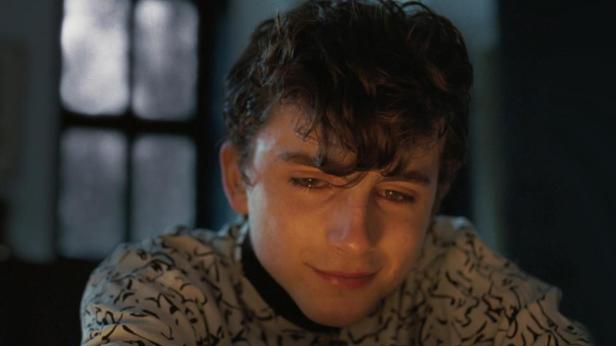
A version of this essay was originally published at The Seventh Row.
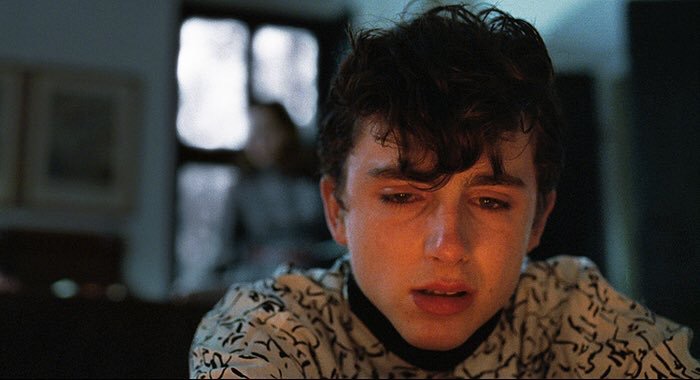
Wow. This was absolutely fantastic!
Thank you for saying that and for reading – it means a lot because this piece means a lot to me.
I was almost lost for words when I finished reading it. This film meant SO MUCH to me and when I find someone who feels the same way about it as I do, I freaking rejoice!
I’m rejoicing at this! So happy that what I wrote resonated with your experience of the film.
Beautiful piece! What a film. Guadagnino is quickly becoming the Italian maestro to follow in the footsteps of Rossellini and Scorsese. I need to watch CMBYN again and I think I’ll do so this weekend.
Do it! And thanks for reading.
Hi! I loved this article and a few days ago I mentioned it and linked it (the SeventhRow version) in my own post about CMBYN. Thought you’d be interested in reading it 🙂
Thanks Daniela. This is wonderful. I really love the structure of this piece.
Thank you for sharing your insights into this beautiful film.
Thanks for reading. I’m always appreciative when someone comes across something I wrote a while ago.